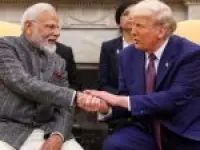
“We’ve Lost India & Russia To Deepest, Darkest China”: Donald Trump’s New Swipe After SCO Summit
U.S. President Donald Trump on Friday posted on TruthSocial that it “looks like we’ve lost India and Russia to deepest, darkest China,” sharing an old photograph of Prime Minister Narendra Modi with Chinese President Xi Jinping and Russian President Vladimir Putin after the Shanghai Cooperation Organisation (SCO) summit in Tianjin.
The flippant wish for a “long and prosperous future” for the three countries was Mr. Trump’s sharpest public acknowledgement yet of the warming ties between New Delhi, Moscow and Beijing.
Looks like we’ve lost India and Russia to deepest, darkest, China. May they have a long and prosperous future together! President Donald J. Trump
(TS: 05 Sep 06:14 ET)… pic.twitter.com/jxEROEIq0H
— Trump Truth Social Posts On X (@TrumpTruthOnX) September 5, 2025
The comment followed a high-profile SCO meeting in Tianjin, where Mr. Modi met Mr. Xi and Mr. Putin. The gathering, which brought the three leaders together to discuss cooperation across energy, trade and security, has been read by many diplomats as a sign that India is pursuing strategic autonomy in foreign policy rather than aligning closely with any single bloc.
Read Also: US Federal Court Overturns Trump Funding Cuts To Harvard
Trump’s post came amid wider U.S. concern about the trilateral chemistry; his former top trade adviser, Peter Navarro, described the leaders’ bonhomie as “troublesome,” urging that India should side with Washington, Europe and Ukraine instead of warming up to Russia.
New Delhi has declined to be drawn into the public spat. The Ministry of External Affairs did not respond directly to Mr. Trump’s TruthSocial post, but ministry spokesperson Randhir Jaiswal rejected Mr. Navarro’s remarks, saying New Delhi had “seen the inaccurate and misleading statements made by Mr. Navarro, and obviously rejects them.” India’s tone has been to emphasise its independent foreign policy choices while avoiding being cast as part of a confrontation between major powers.
Trade tensions also form the backdrop to the exchange. The current U.S. administration has imposed a 25 per cent reciprocal tariff on many Indian imports and added a further 25 per cent levy aimed at dissuading New Delhi from buying Russian crude, bringing the total duties on some Indian goods to roughly 50 per cent.
Washington has defended the levies as necessary pressure, while India has called them “unjustified and unreasonable,” arguing the measures penalise a long-standing trading partner.
India’s energy ties with Russia have become a flashpoint in Washington. President Trump and his aides have repeatedly accused India of effectively financing Moscow through purchases of discounted Russian oil, an allegation New Delhi disputes.
Read Also: Sanctions Contradiction: Trump Unaware Of US Imports From Russia Amid Criticism Of India
As External Affairs Minister S. Jaishankar has pointed out that the United States has not applied the same standards to other large energy buyers such as China or the European Union, which continue to import significant volumes of Russian energy.
Mr. Trump’s comments also follow an earlier post in which he accused China’s leader of “conspiring” against the United States alongside North Korea’s Kim Jong-un and Russia’s Vladimir Putin.
Beijing pushed back against that line, with a Chinese spokesperson saying that China’s diplomatic ties are not directed against any third party and rejecting the idea of a targeted anti-U.S. bloc.
Analysts say the Tianjin meeting and the public exchange that followed underscore the limits of U.S. leverage in the region. While Washington has long viewed India as a potential counterweight to China, a mix of economic frictions, including the tariffs, and India’s insistence on strategic autonomy, have complicated that relationship.
The SCO summit showed India engaging simultaneously with multiple major powers, a posture New Delhi describes as pragmatic rather than adversarial.













